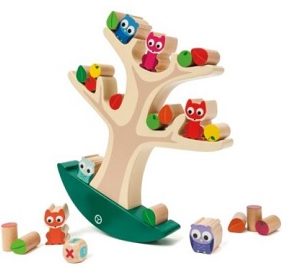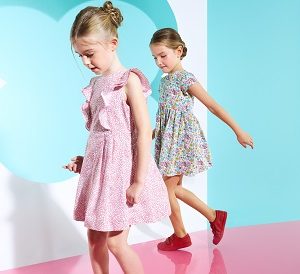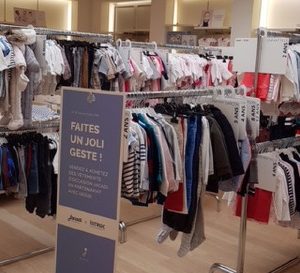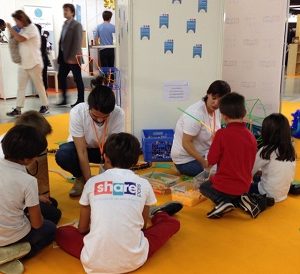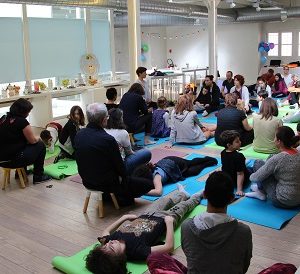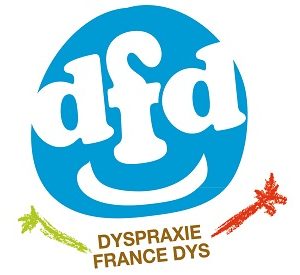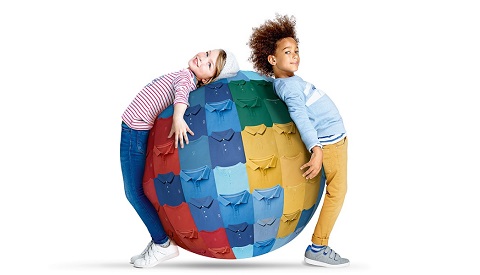

The ÏDKIDS group is committed to improving all of its processes, which means it must work on how its collections are produced.
1) What is responsible production?
Responsible production is a global corporate initiative that requires us all to take the social and environmental impact of our actions into account. It involves every member of the ÏDKIDS community, including our suppliers, partners, employees and parent and child customers.
Find out more about our CSR policy
2) How are our products responsible?
ÏDKIDS brands are committed to social and environmental progress. Our responsibility is to ensure the quality of our products and the conditions they are manufactured in. In concrete terms this entails:
- Making sure our products do not contain any chemicals that are potentially harmful to children or the environment.
- Using responsible materials to manufacture our products (e.g. responsible cotton and fibres, recycled polyester) and packaging and ensuring that our suppliers do likewise.
- Monitoring the social conditions at production sites by carrying out social audits with our suppliers.
3) How do we guarantee our commitments are met?
With regard to the environmental quality of its products, ÏDKIDS keeps a close eye on regulations to identify any chemicals that could potentially be harmful to children or the environment. Our products are regularly tested to make sure they comply with current standards in their countries of distribution (e.g. REACH).
We also work closely with labels such as Oeko-Tex to certify the quality of the raw materials we use in our products. ÏDKIDS adheres to the highest regulatory standards in the countries its products are sold in.
We also follow a comprehensive action plan to monitor the social conditions on product manufacturing sites.
For a brand like Okaïdi this involves:
- Asking suppliers to sign up to a code of conduct inspired by OECD guiding principles and ILO conventions.
- Independently verifying that social conditions are respected at production sites.
- Working towards progress as a member of Initiative Clause Sociale (ICS), a group of independent experts whose goal is to sustainably improve working conditions and promote responsible trade.
- Pursuing a responsible procurement policy by training our staff in best practice.
Learn more about Okaïdi’s commitments
4) What is a more responsible material?
It’s a more environmentally-friendly material that uses less natural resources, less energy and is recyclable and recycled. It must also be more responsible from a social point of view. Its production must comply with human and labour rights and guarantee a reasonable and stable income for its growers.
Learn more about responsible materials
5) What responsible materials do we use?
Depending on the brand, collection and season, we use different materials and are always trying to make them more responsible.
- Cotton: conventional cotton production is a very polluting industry, mainly because it uses so much water and requires a lot of insecticide and herbicide. To alleviate the impact on the environment, we are committed to sourcing more responsible and/or organic cotton. For example, 50% of Okaïdi’s collections since Autumn-Winter 2017 contain more responsible cotton (better for nature and producers). As part of our progressive approach, we have set ourselves a target of 100% by the end of 2020.
- Polyester is an artificial fibre made from petrol. Okaïdi and Jacadi decided to use recycled polyester made from plastic bottles and recycled plastic for certain items to help reduce the amount of petrol used and waste produced. By joining forces with REPREVE, an organization that produces recycled fibres, Okaïdi has recycled the equivalent of 10 million small bottles.
- Sustans® is a fibre made from renewable, partly plant-based components and is an excellent alternative to feathers for filling winter jackets, for example. It is produced by fermenting corn, which uses 30% less energy and therefore reduces greenhouse gas emissions.
6) What is the difference between more responsible cotton and organic cotton?
Unlike conventional cotton, organic cotton is grown without pesticides or herbicides. It made up 28% of the baby sleepwear featured in the Obaïbi Autumn-Winter 2017 collection.
More responsible cotton is grown using less pesticides, fertilizers and water than conventional cotton. ÏDKIDS is a member of the Better Cotton Initiative (BCI), the largest sustainable cotton production programme in the world that also aims to protect cotton growers.
